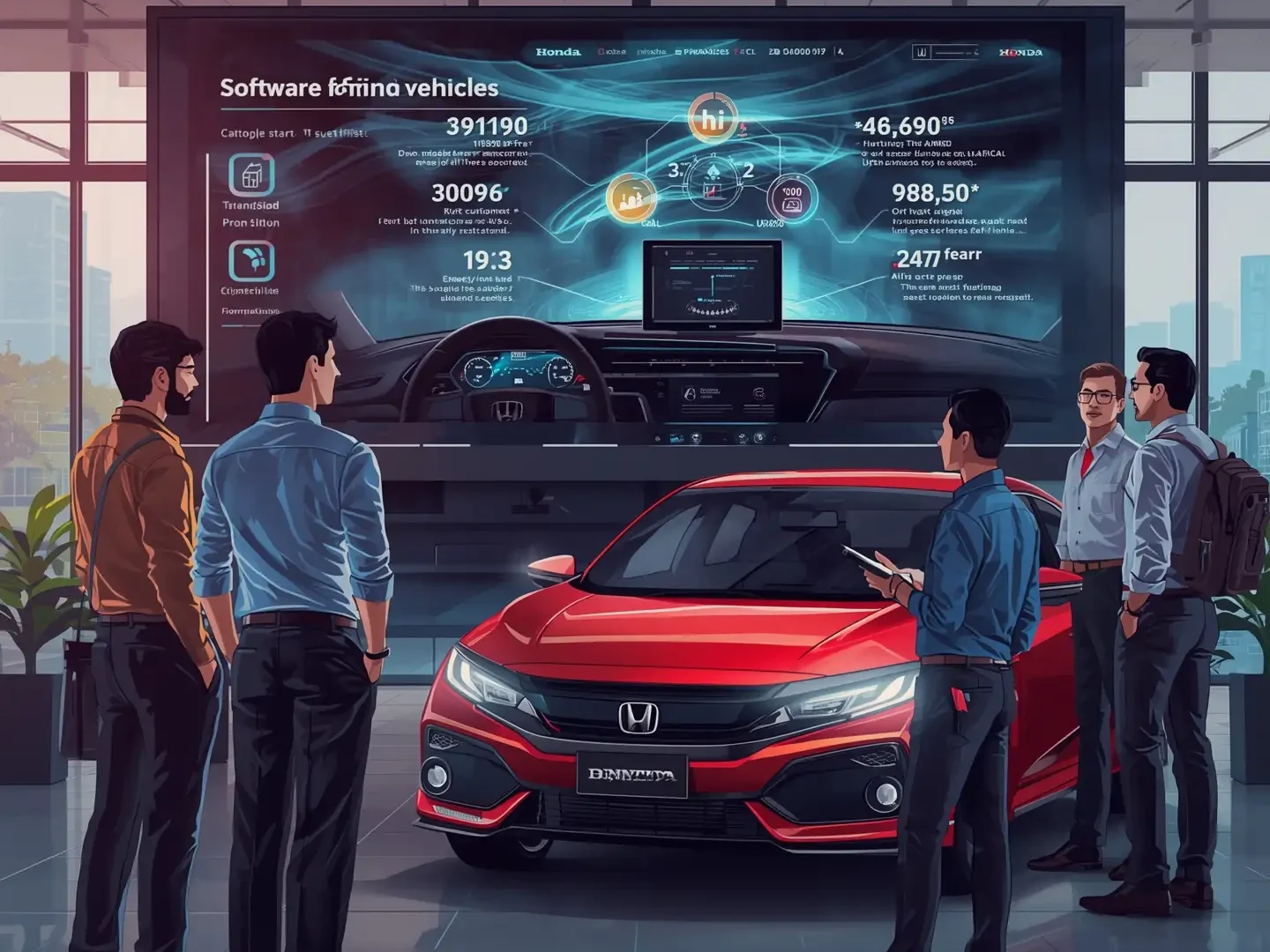Honda Auto Financing Business: A Transformative Step in India
The global automobile industry has been witnessing a dramatic transformation in recent years, with manufacturers diversifying beyond producing and selling vehicles. Increasingly, carmakers are stepping into financial services to create end-to-end ecosystems for their customers. Honda, one of the most trusted automobile brands worldwide, has now taken a significant step in India by establishing a new Honda subsidiary India dedicated to financial services.
The new company will focus on vehicle retail financing, leasing, and other financial solutions that make car and two-wheeler ownership more accessible. To operate legitimately and competitively in this sector, Honda is applying for an NBFC licence in India, a move that signals its intent to compete head-on with established banks and non-banking financial companies.
This comprehensive analysis will explore the rise of the Honda auto financing business, its impact on the automobile financing market, and why this development is a game-changer for customers and the broader economy.
Honda Finance India NBFC license application status

The launch of the Honda auto financing business comes at a critical juncture. India is the world’s third-largest automobile market, with millions of two-wheelers and cars sold every year. However, most purchases are made on credit rather than upfront cash payments. Close to 80% of cars and over 60% of two-wheelers are financed through loans.
Honda has been operating successfully in India for decades, but until now, customers depended on third-party financiers for loans. By creating its own financial arm, Honda can reduce the dependence on external lenders, customize loan products, and offer competitive rates. More importantly, it strengthens the emotional connection between Honda and its customers, as financing becomes part of the overall ownership journey.
The timing also aligns with rising consumer expectations. Customers now demand quick approvals, transparent loan structures, and digital convenience. Honda, through its dedicated financial entity, can meet these needs while ensuring a seamless link between dealerships and finance offices.
The Importance of Securing an NBFC Licence in India
For Honda to legally engage in vehicle financing, it must obtain an NBFC licence in India. This licence, issued by the Reserve Bank of India (RBI), is crucial because it legitimizes non-banking entities to provide loans, leasing, and other credit facilities.
NBFCs play a huge role in India’s financial ecosystem. They fill credit gaps left by banks, particularly in rural and semi-urban areas, and are often more flexible in offering loans. Honda’s entry as an NBFC means it can serve a wide range of customers, from urban car buyers to rural two-wheeler owners.
| Aspect | Importance |
|---|---|
| Legal Recognition | Provides official authorization to operate as a financial service provider. |
| Customer Trust | Builds credibility and confidence among borrowers and investors. |
| Regulatory Compliance | Ensures adherence to RBI guidelines and safeguards against legal issues. |
| Business Expansion | Allows entry into diverse financial services like loans, leasing, and finance. |
| Access to Capital | Helps raise funds from banks, institutions, and investors. |
The process, however, is rigorous. To qualify for the licence, Honda must meet capital adequacy norms, risk management requirements, and corporate governance standards. Yet, given Honda’s global reputation and financial strength, industry experts believe the approval will be a formality rather than a hurdle.
Once operational, the new NBFC will allow Honda to provide not just loans but also leasing solutions, refinancing, and even innovative subscription-based models for young consumers who prefer access over ownership.
Honda New subsidiary retail financing India details
The creation of Honda subsidiary India dedicated to financing shows the company’s vision for the long-term Indian market. Honda already operates financing arms in countries such as the United States, Japan, and Europe. These subsidiaries contribute significantly to the company’s overall profits, proving that financial services are more than just a side business.
In India, the subsidiary will initially focus on vehicle loans for Honda two-wheelers and cars. However, the scope may later expand to include:
- Leasing services for corporate fleets
- Electric vehicle financing
- Personal loans bundled with vehicle purchases
- Insurance and warranty add-ons tied to financing packages
By offering these services under one roof, Honda positions itself as not only a vehicle manufacturer but also a comprehensive mobility solutions provider.
The Automobile Financing Market in India
The automobile financing market in India is vast and growing. It includes banks, NBFCs, captive finance companies (subsidiaries of automakers), and fintech-based lenders.
Key Features of the Market:
- High Loan Penetration – Over 75% of new cars and a significant portion of two-wheelers are bought on loans.
- Growing Rural Demand – With rising rural incomes, two-wheeler financing in small towns and villages is booming.
- Digital Transformation – Fintech lenders have introduced app-based approvals, AI-driven credit scoring, and paperless processes.
- Shift to EVs – As electric vehicles grow in popularity, new financing models like battery leasing are emerging.
Honda’s entry is expected to make the market more competitive. By leveraging its dealership network and brand trust, the company can attract customers who prefer brand-backed financial products over third-party loans.
Honda financing india software-defined vehicles strategy
The Honda auto financing business offers several strategic benefits:
- Customer Retention – Financing creates a long-term bond between Honda and its customers, increasing the likelihood of repeat purchases.
- Competitive Pricing – By managing financing in-house, Honda can offer better loan rates than many NBFCs or banks.
- Faster Approvals – Direct integration with dealerships means quicker processing.
- Bundled Offerings – Honda can tie financing with insurance, service packages, and extended warranties.
- Digital Advantage – Online loan applications, AI-based approvals, and mobile app tracking can make the process more efficient.
These advantages make Honda’s move a win-win for both the company and its customers.
Regulatory Landscape for NBFC Licence in India
The RBI’s oversight of NBFCs is designed to protect the financial system from risks. For Honda’s new venture, obtaining an NBFC licence in India involves:
- Maintaining a minimum net-owned fund of ₹10 crore or more
- Establishing strong risk management practices
- Adopting transparent governance structures
- Ensuring compliance with periodic audits and reporting requirements
Here’s a simple table on Regulatory Landscape for NBFC Licence in India:
| Regulatory Aspect | Details |
|---|---|
| Governing Authority | Reserve Bank of India (RBI) |
| Minimum Net Owned Fund (NOF) | ₹10 crore required for new NBFC applicants |
| Application Process | Online submission via RBI’s COSMOS portal followed by physical documents |
| Compliance Requirements | Adherence to RBI prudential norms, KYC, and fair lending practices |
| Supervision | Regular RBI inspections, audits, and reporting obligations |
Honda’s global compliance culture and financial strength make it well-equipped to meet these demands. Once approved, the licence will allow Honda to roll out retail financing products tailored to the Indian market.
Honda Finance India Private Limited launch India
The establishment of Honda subsidiary India marks a shift in the automotive industry’s business model. No longer are automakers just manufacturers—they are evolving into end-to-end mobility solution providers.
For customers, this means a seamless experience: buying a vehicle, securing a loan, arranging insurance, and even opting for leasing or subscription, all from a single brand. For Honda, it creates an additional revenue stream and greater control over the customer lifecycle.
The move is also a response to competitors. Maruti Suzuki, Hyundai, and Tata Motors already partner with or operate financing ventures. With its dedicated subsidiary, Honda strengthens its foothold in India’s evolving financial ecosystem.
Competition in the Automobile Financing Market
The automobile financing market in India is highly competitive, with established players like HDFC Bank, ICICI Bank, Bajaj Finance, Mahindra Finance, and newer fintech entrants like Paytm and MobiKwik.

Honda’s entry will bring a unique advantage: specialization. While banks and NBFCs spread their risk across sectors, Honda’s financing focus will be entirely on vehicles. This specialization allows it to design products suited to specific customer segments, such as:
- Students buying two-wheelers with flexible repayment terms
- Corporate employees opting for car leasing programs
- Rural buyers with seasonal repayment structures
By targeting niche segments, Honda can carve out a loyal financing customer base.
Technology and the Honda Auto Financing Business
Technology will be central to the success of the Honda auto financing business. Digital platforms will enable:
- Paperless loan approvals
- AI-driven credit checks
- Real-time loan tracking for customers
- Integration with online vehicle booking portals
Such innovations will particularly appeal to millennials and Gen Z buyers who expect speed, transparency, and convenience.
Impact of NBFC Licence in India on Rural and Urban Buyers
By securing an NBFC licence in India, Honda gains the ability to cater to diverse markets. Urban buyers will benefit from quick digital loan approvals and leasing options, while rural buyers will gain access to flexible two-wheeler loans.
| Aspect | Rural Impact | Urban Impact |
|---|---|---|
| Credit Access | Loans for farmers, traders | Quick personal loans |
| Ease of Borrowing | Doorstep services | Digital approvals |
| Financial Growth | Farm tools, housing | Cars, real estate |
| Repayment Flexibility | Seasonal repayments | Flexible EMIs |
This dual focus allows Honda to tap into both premium urban markets and high-volume rural regions. Given the popularity of Honda’s two-wheelers in rural India, this could significantly boost sales.
Benefits for Customers from Honda Subsidiary India
For consumers, the Honda subsidiary India will mean:
- Transparent, brand-backed financing options
- Reduced dependence on external lenders
- Faster processing through dealerships
- Tailored schemes for repeat Honda buyers
- Innovative products like subscription and leasing
Such benefits are likely to change how customers perceive financing, shifting preference toward manufacturer-backed loans.
Future of the Automobile Financing Market in India
The automobile financing market is projected to grow rapidly, driven by rising incomes, urbanization, and digital innovation. Analysts predict that by 2030, auto financing will become even more diverse, with EV-specific financing models dominating the landscape.
Honda’s entry ensures it remains ahead of this curve. Its financing arm will not only support vehicle sales but also create new opportunities in EV adoption, leasing, and mobility services.
Honda’s Long-Term Vision in India

| Factor | Future Trend |
|---|---|
| Digital Financing | Rise of AI-based loan approvals |
| EV Adoption | Special financing for electric cars |
| Rural Penetration | Wider credit access in villages |
| Partnerships | Automakers tying up with NBFCs/banks |
| Customer Experience | Faster, paperless financing processes |
Honda’s commitment goes beyond selling cars and bikes. With the Honda auto financing business, the company aims to become a one-stop solution for mobility. This aligns with global trends where automakers are no longer just manufacturers but complete mobility service providers.
The integration of financing strengthens Honda’s position in India, a market that continues to be critical for its global strategy.
Conclusion: A Turning Point for India’s Auto Industry
The launch of the Honda auto financing business, combined with the pursuit of an NBFC licence in India, signifies a major transformation in how the company operates in the country. With a new Honda subsidiary India at the helm, the brand is ready to redefine customer experience in the automobile financing market.
For buyers, this means better rates, faster approvals, and more innovative financing solutions. For the industry, it signals a shift where automakers take greater control of the financial ecosystem.
As India moves toward a future of electric mobility and digital finance, Honda’s bold step ensures it remains at the forefront of change.
Further Readings:
- Revival of India–US Trade Talks 2025| Tariffs, BTA & New Opportunities
- Complete Guide to Trade License for Business in India
- Shocking Changes in Indian Banking Rules for NRIs 2025

